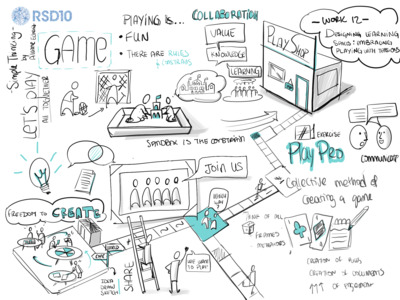Designing Learning Spaces: Embracing playing with tensions
Gulden, Tore, Steier, Frederick, Bunnell, Pille, Pangaro, Paul and da Silva, Flavio Mesquita (2021) Designing Learning Spaces: Embracing playing with tensions. In: Proceedings of Relating Systems Thinking and Design (RSD10) 2021 Symposium, 2-6 Nov 2021, Delft, The Netherlands.
![Gulden_Rsd10_2021.png [thumbnail of Gulden_Rsd10_2021.png]](https://openresearch.ocadu.ca/3821/1.hassmallThumbnailVersion/Gulden_Rsd10_2021.png)  Preview |
Image
Gulden_Rsd10_2021.png Available under License Creative Commons Attribution Non-commercial No Derivatives. Download (1MB) | Preview |
Abstract
We prefer to call this interactive workshop a Playshop.
We feature a brief introduction with a conceptual foundation around key themes and then an interactive task. The interactive task brings together Play Probes (Gulden) with ideas of framing (from Bateson) and play in the design of learning spaces. The task allows us to emphasize both content and process issues, as the task is an opening up to tensions being unconcealed, with reflection on tacit assumptions about design, play, and systemic understanding. With reflexivity being a key issue in systems design, this session also reflects on how we are enacting the very process we are inquiring into, about playing with tensions.
Recognizing the proliferation of the use of AI and its relationship to the design of virtual learning spaces, we also make connections with the proposed session on the New Macy conferences, and how assumptions of AI shape not only how we create what is possible in a learning space, but also encourage movement away from the importance of play and tolerance, even embrace, of variety.
The format of the playshop involves cross-pollination of teams, bringing in possibilities from The World Café (Steier, Brown, da Silva). In addition, we encourage people to draw their ideas together, while also reflecting on the use of the visual and oral, which may itself create tensions as opportunities for design.
As a summary, the format is an introduction, the initial phase of groups, the second phase with cross-pollination, sharing of ideas (focus on play and tensions emerging) and then wrapping up – with a look to the future.
This workshop was designed as a face-to-face event; however, it is also set it up so that it can be done virtually. Indeed, the very tension between the two – if face-to-face what is gained compared to it being virtual, if virtual, what is gained (or lost?) compared to it being face-to-face – is part of the playshop. We also bring in what new expectations are present from experiences in virtual meeting spaces, such as the use of chat – but also others – and how those new mediated features also allow us to play with tensions in design conversations and meetings.
Workshop agenda
At the heart of our playshop, key themes of play, tensions (and paradox), complexity, and systemic design methods will be featured. We see a particularly strong connection with the overall theme of Collaboration and contexts in systemic design.
For some elaboration, one of the key themes is the idea of play probes. The intention with a play probe is to elicit creative agency, playful behaviour, and a natural dialogue about a specific theme that is intended explored by the researchers, among the workshop partakers through framing. The idea of such elicitation is to be able to observe the discussion, behaviour, and possible tensions, connected to the theme studied, that the play probe may produce. An example of such a frame could be a partly designed board game that lacks rules and goals for the gameplay or a well-known board game such as Snakes and Ladders that is stripped for rules. The play probe will contain an assignment for the partakers to for example define the goal with the game aligned to the situation studied and describe reasons for why you have to move back or may move forward when playing the game. The play probe thus is meant to elicit natural dialogues, discussions, tensions, and dynamics that are connected to a specific theme and study that makes it possible for the researchers to observe without interventions by for example questions.
In addition to play probes, the very idea of play will be foregrounded. Here we will build on Gregory Bateson’s classic: The Message This is Play and recognize how an invitation to play can operate as a metacommunicative space that leads into ideas of framing and context (how will we know that each of us is playing, as compared to, for example fighting, or arguing. How will we know that we are being seen or heard as playing). We will bring in Bateson’s ideas of frames and framing as well as Kees Dorst’s framing design. Consistent with the theme of playing with tensions, we will also, at the outset, introduce what can be understood as the paradox of framing (including with the play frame). Here we recognize that we need to assume that we are in the same frame as others when we are in conversation with each other in order to interact together – but at the same time NOT make this same assumption that we are truly in the same frame, as we need always be prepared to question this assumption when we recognize that it may not be held at that moment. While this paradox holds in general, it is especially pertinent in play frames – and also in the design process. Part of our playshop will thus be about how the design of learning contexts is so difficult.
| Item Type: | Conference/Workshop Item (Other) |
|---|---|
| Divisions: | Faculty of Design |
| Date Deposited: | 24 May 2022 13:49 |
| Last Modified: | 24 May 2022 13:49 |
| URI: | https://openresearch.ocadu.ca/id/eprint/3821 |
Actions (login required)
 |
Edit View |

 Lists
Lists Lists
Lists